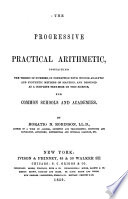 | James Robinson - 1850 - 342 σελίδες
...numbers in arithmetical progression, when we have the extremes and number of terms given. • RULE. Multiply the sum of the extremes by the number of terms, and divide the product by 2, the quotient will be the sum of all the terms. 1. The extremes of* an arithmetical... | |
 | Benjamin Greenleaf - 1851 - 332 σελίδες
...multiplied by the number of terms, the product will be double the sum of either series. Hence, RDLE I. — Multiply the sum of the extremes by the number of terms, and half the product will be the sum of the series. Or, RULE II. — Multiply the sum of the extremes by half the number of terms, and... | |
 | William Smyth - 1851 - 272 σελίδες
...To find, therefore, the sum of all the terms, when the extremes and the number of terms are given, Multiply the sum of the extremes by the number of terms, and take one-half of the product. Ex. 1. In a progression by difference, the first term is 5, the last... | |
 | Benjamin Greenleaf - 1854 - 342 σελίδες
...multiplied by the number of terms, the product will be double the sum of either series. Hence, > RULE I. — Multiply the sum of the extremes by the number of terms, and half the product will be the sum of the series. Or, RULE II. — Multiply the sum of the extremes by half the number of terms, and... | |
 | Benjamin Greenleaf - 1857 - 336 σελίδες
...multiplied by the number of terms, the product will be double the sum of either series. Hence, RULE 1. — Multiply the sum of the extremes by the number of terms, and half the product will be the sum of the series. Or, RULE 2. — Multiply the sum of the extremes by half the number of terms, and... | |
 | Horatio Nelson Robinson - 1859 - 352 σελίδες
...is twice the sum of the series. Dividing 80 by 2 gives 40, which is the sum required. Hence, RULE. Multiply the sum of the extremes by the number of terms, and divide the product by 2. EXAMPLES. 1. The extremes are 5 and 32, and the number of terms 12 ; what... | |
 | Horatio Nelson Robinson - 1860 - 444 σελίδες
...80, -which is twice the sum of the series ; and 80 —• 2 = 40, the sum of the series. Hence RULE. Multiply the sum of the extremes by the number of terms, and divide the product by 2. EXAMPLES FOR PRACTICE. 1. Find the sum of the series the first term of which... | |
 | Benjamin Greenleaf - 1861 - 338 σελίδες
...multiplied by the number of terms, the product will be double the sum of either series. Hence, RULE 1. — Multiply the sum of the extremes by the number of terms and half the product will be the sum of the series. Or, RULE 2. — Multiply the sum of the extremes by half the number of terms, and... | |
 | Daniel Adams - 1861 - 452 σελίδες
...$124, $118, $112, $106, $100, form a descending arithmetical progression, and to find the sum due, multiply the sum of the extremes by the number of terms, and take half the product, thus : $142 + $100=$242; and $242 x 8=$1936, which -H 2=Ans. EXAMPLES. 2. A... | |
 | William Davis (B.A.) - 1864 - 96 σελίδες
...subtract A's, there remains C's gain— £43 5 what was the gain of each ? ARITHMETICAL PROGRESSION. 1. The first term of an arithmetical series is 3, the last 15, and the number of terms 13; what is the sum of the series ? 2. When the first term is 6, the last... | |
| |